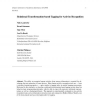Free Online Productivity Tools
i2Speak
i2Symbol
i2OCR
iTex2Img
iWeb2Print
iWeb2Shot
i2Type
iPdf2Split
iPdf2Merge
i2Bopomofo
i2Arabic
i2Style
i2Image
i2PDF
iLatex2Rtf
Sci2ools
128
click to vote
FUIN
2008
2008
Relational Transformation-based Tagging for Activity Recognition
Abstract. The ability to recognize human activities from sensory information is essential for developing the next generation of smart devices. Many human activity recognition tasks are -- from a machine learning perspective -- quite similar to tagging tasks in natural language processing. Motivated by this similarity, we develop a relational transformation-based tagging system based on inductive logic programming principles, which is able to cope with expressive relational representations as well as a background theory. The approach is experimentally evaluated on two activity recognition tasks and an information extraction task, and compared to Hidden Markov Models, one of the most popular and successful approaches for tagging.
| Added | 10 Dec 2010 |
| Updated | 10 Dec 2010 |
| Type | Journal |
| Year | 2008 |
| Where | FUIN |
| Authors | Niels Landwehr, Bernd Gutmann, Ingo Thon, Luc De Raedt, Matthai Philipose |
Comments (0)

